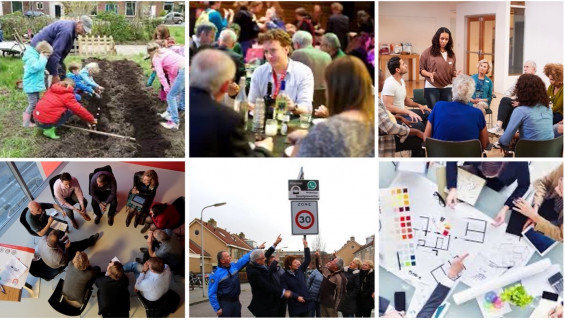This is the 24st episode of a series 25 building blocks to create better streets, neighbourhoods, and cities. Its topic is how involving citizens in policy, beyond the elected representatives, will strengthen democracy and enhance the quality of the living environment, as experienced by citizens.
Strengthening local democracy
Democratization is a decision-making process that identifies the will of the people after which government implements the results. Voting once every few years and subsequently letting an unpredictable coalition of parties make and implement policy is the leanest form of democracy. Democracy can be given more substance along two lines: (1) greater involvement of citizens in policy-making and (2) more autonomy in the performance of tasks. The photos above illustrate these lines; they show citizens who at some stage contribute to policy development, citizens who work on its implementation and citizens who celebrate a success.
Citizen Forums
In Swiss, the desire of citizens for greater involvement in political decision-making at all levels is substantiated by referenda. However, they lack the opportunity to exchange views, let alone to discuss them.
In his book Against Elections (2013), the Flemish political scientist David van Reybrouck proposes appointing representatives based on a weighted lottery. There are several examples in the Netherlands. In most cases, the acceptance of the results by the established politicians, in particular the elected representatives of the people, was the biggest hurdle. A committee led by Alex Brenninkmeijer, who has sadly passed away, has expressed a positive opinion about the role of citizen forums in climate policy in some advice to the House of Representatives. Last year, a mini-citizen's forum was held in Amsterdam, also chaired by Alex Brenninkmeijer, on the concrete question of how Amsterdam can accelerate the energy transition.
Autonomy
The ultimate step towards democratization is autonomy: Residents then not only decide, for example, about playgrounds in their neighbourhood, they also ensure that these are provided, sometimes with financial support from the municipality. The right to do so is formally laid down in the 'right to challenge'. For example, a group of residents proves that they can perform a municipal task better and cheaper themselves. This represents a significant step on the participation ladder from participation to co-creation.
Commons
In Italy, this process has boomed. The city of Bologna is a stronghold of urban commons. Citizens become designers, managers, and users of part of municipal tasks. Ranging from creating green areas, converting an empty house into affordable units for students, the elderly or migrants, operating a minibus service, cleaning and maintaining the city walls, redesigning parts of the public space etcetera.
From 2011 on commons can be given a formal status. In cooperation pacts the city council and the parties involved (informal groups, NGOs, schools, companies) lay down agreements about their activities, responsibilities, and power. Hundreds of pacts have been signed since the regulation was adopted. The city makes available what the citizens need - money, materials, housing, advice - and the citizens donate their time and skills.
From executing together to deciding together
The following types of commons can be distinguished:
Collaboration: Citizens perform projects in their living environment, such as the management of a communal (vegetable) garden, the management of tools to be used jointly, a neighborhood party. The social impact of this kind of activities is large.
Taking over (municipal) tasks: Citizens take care of collective facilities, such as a community center or they manage a previously closed swimming pool. In Bologna, residents have set up a music center in an empty factory with financial support from the municipality.
Cooperation: This refers to a (commercial) activity, for example a group of entrepreneurs who revive a street under their own responsibility.
Self-government: The municipality delegates several administrative and management tasks to the residents of a neighborhood after they have drawn up a plan, for example for the maintenance of green areas, taking care of shared facilities, the operation of minibus transport.
<em>Budgetting</em>: In a growing number of cities, citizens jointly develop proposals to spend part of the municipal budget.
The role of the municipality in local initiatives
The success of commons in Italy and elsewhere in the world – think of the Dutch energy cooperatives – is based on people’s desire to perform a task of mutual benefit together, but also on the availability of resources and support.
The way support is organized is an important success factor. The placemaking model, developed in the United Kingdom, can be applied on a large scale. In this model, small independent support teams at neighbourhood level have proven to be necessary and effective.
Follow the link below to find an overview of all articles.





